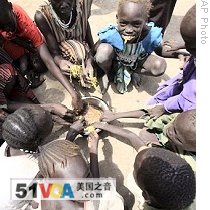Geneva
21 July 2009
The United Nations reports it is running a record funding-shortfall of $4.8 billion for its aid operations in 16 crisis-ridden countries. The United Nations says it has received less than half of the $9.5 billion it needs to carry out it humanitarian operations this year.
 |
| Internally displaced Sudanese children seen as they eat, in Akobo town in Jonglei State, South Sudan (File) |
Unfortunately, the top U.N. humanitarian official, John Holmes, says the world is in worse financial shape this year than last and this is having an effect on U.N. fund-raising capabilities.
"It is also the case that the global recession itself is having an effect on the number of people in need," said Holmes. "Climate change and the adverse weather that that has an influence on means that there is continued poor harvest in many countries-and again that has an influence, a significant influence on agriculture and therefore on the amount of food assistance that is required. And, food is always the biggest single component of these appeals."
Holmes says Sudan is running the biggest shortfall of $916 million.
 |
| U.N. humanitarian affairs chief John Holmes, 25 Feb 2008 |
But Holmes notes the most dramatic need is in Pakistan.
"Pakistan has seen probably the most dramatic and dramatically changing humanitarian situation this year with up to two million people fleeing the military operations in parts of NW Frontier Province. Up two million, as I say. That has meant scaling up, putting up or scaling up a major aid operation with a consequence of large figure of dollars attached to it," he added.
Other areas of concern include Zimbabwe, which continues to suffer from food security. But Holmes says U.N. aid workers have been more successful in assisting people in the country since the creation of the power-sharing government.
The U.N. humanitarian official says other situations include the 250,000 Tamil civilians who remain displaced in camps in the northern part of Sri Lanka. He says millions of Iraqi refugees in Syria and Jordan, as well as millions of Iraqis displaced in their own country continue to need food, water, shelter and other basic relief.